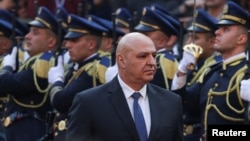Lebanese lawmakers have elected army chief Joseph Aoun as the country’s new president, ending a two-year gridlock in a clear sign of the weakening of Hezbollah, the Iranian-backed political party and military force that had scuttled past efforts to name a president.
Lawmakers from Hezbollah, which is a U.S.-designated terrorist group, and its ally Amal had for two years obstructed attempts to elect a president by walking out of the parliament, preventing it from reaching a quorum.
This time, however, they voted for Aoun in the second round on January 9 after their preferred candidate dropped out.
In the end, Aoun secured a commanding second-round victory, winning 99 out of 128 votes after falling short of the two-thirds majority required for victory in the first round.
Hezbollah’s devastating war with Israel late last year caused significant damage in Lebanon, particularly in the capital, Beirut, and weakened the Shi’ite group militarily, socially, and, it seems, politically.
Hamidreza Azizi, a fellow at the German Institute for International and Security Affairs, said the election of the U.S-backed Aoun indicates that Hezbollah has “come to terms with the new political realities” in Lebanon.
He said that, by backing Aoun’s election, Hezbollah sought to avoid being blamed for prolonging Lebanon’s political gridlock while also ensuring that more staunchly anti-Hezbollah figures such as Samir Geagea did not become president.
“[Hezbollah’s] focus remains on survival while working toward a more stable situation in the country, which they hope to use over time to regain strength and rehabilitate their position,” Azizi added.
Aoun’s election was backed by the United States, France, and Iran’s regional rival Saudi Arabia, indicating that Riyadh’s influence in Lebanon will likely grow at Tehran’s expense.
“It is quite evident that, as Hezbollah’s role diminishes in Lebanon’s political and military affairs, Iranian influence is also waning,” Azizi argued.
Losing influence in Lebanon caps off a catastrophic few months for Iran, which has witnessed the battering of its sprawling network of regional proxies and the fall of longtime Syrian President Bashar al-Assad.
Still, Tehran appears supportive of Hezbollah’s strategy of maintaining a lower profile and focusing on rebuilding its strength, according to Azizi.
Even Iranian President Masud Pezeshkian has welcomed Aoun's election, saying it was a "reinforcement of stability and unity" in the country.
Iranian state-affiliated media, meanwhile, have avoided criticizing Aoun, with one news agency even describing him as an “impartial” and “relatively popular” figure.
In his victory speech, Aoun vowed that only the Lebanese state would have a "monopoly" on weapons in a comment seen as a pledge to disarm Hezbollah, which has long been considered a more powerful force than the Lebanese military.
Azizi said disarming Hezbollah is a longer-term goal which is “easier said than done” and that for “clear-eyed” Aoun, the immediate priority is establishing stability in Lebanon.
Of more immediate concern, analysts say, is the implementation of an Israeli-Hezbollah cease-fire while also seeking funding to rebuild Lebanon, especially in areas in the south and east that were hit hard by the fighting.
"Aoun has interlocking objectives. He has to address Hezbollah's weapons through some sort of dialogue forum. Yet he can only do so if he secures funding to rebuild mainly Shi'a areas. And for this he must engage in economic reform, because the Gulf states now demand it," said Michael Young of the Carnegie Middle East Center.










